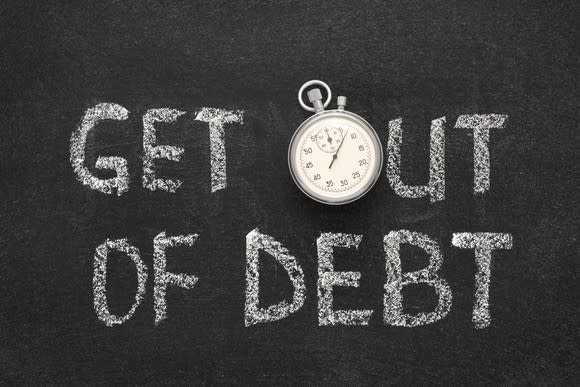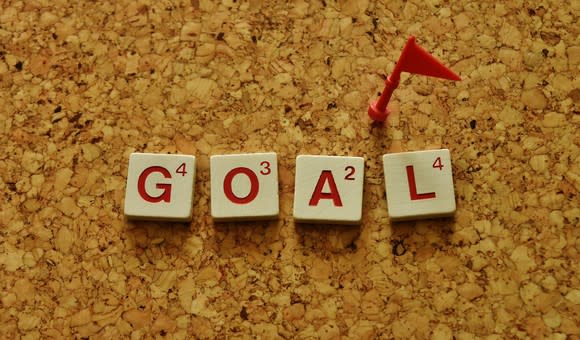Study Says: This Is the Best Way to Pay Off Debt
We humans are not always rational. That's especially true in our financial lives, where we'll sometimes buy something we don't need because it's bargain priced, or when we put off saving for retirement despite the fact that our earliest invested dollars will have the most time to grow.
It's the same with debt. If you find yourself saddled with a lot of debt, there are different strategies for paying it off, and according to a report in the Harvard Business Review, the most effective one isn't the most rational.

Image source: Getty Images.
Strategies to pay off debt
It's crucial for anyone carrying a lot of debt, especially high-interest-rate debt, to pay it off as soon as possible. The good news is that you can pay off your debt, and many people have paid off way more than you probably owe. You can approach the task in a variety of ways, some of which are better than others. For example:
No. 1: Make payments of at least the minimum due
This is a basic approach, and it can take a long time if you're not aggressive -- such as if you make only small or minimum payments. For example, imagine that you owe $20,000 on your credit card(s) and that you're being charged a not-uncommon 25% interest rate. If your minimum payments are 3% of your balance, you'll be starting out paying a whopping $600 per month, meaning you'll have to come up with $150 per week. If you can't, your balance will be growing, digging you deeper into debt.
But let's say you do make that $600 payment and all future 3% payments. How effective will that be? Well, according to a Bankrate.com calculator, it will take more than 30 years to pay the debt off, and your total payments will exceed $63,000 -- all for a $20,000 balance owed. It's best to aim to make maximum payments, not minimum ones.
No. 2: Prioritize your debts and tackle the highest-interest debt first
This is a very rational way to approach paying off debt, because the higher the rate, the more you'll pay in interest, so you can save the most by retiring your debts with the highest interest rates first. (Of course, while focusing on your most expensive debt, you'll still need to make minimum payments on your less costly debt.)
No. 3: Prioritize your debts and tackle the smallest ones first
Another strategy, often referred to as the "snowball" method, has you paying off your smallest debts first. The thinking is that it will deliver more satisfaction if you're able to go from, say, five debts to three debts in a relatively short period of time -- gaining momentum.

Image source: Getty Images.
The research says: Be irrational
Given the three options above, the second is the most effective, mathematically and financially speaking. But researchers have found that the third approach is actually most effective for many people.
After studying the accounts of almost 6,000 clients of a financial services company over three years, researchers Remi Trudel, Keri Kettle, Simon Blanchard, and Gerald Haubl found that:
Those who concentrated their repayments on a single account, as opposed to those who spread them out over multiple accounts, were more motivated and paid off their debt 15% quicker.
Those who paid down accounts with the smallest balances had the greatest sense of progress and were most motivated. It turns out that the portion of the balance being paid off is important.
These findings are meaningful because they go against some common recommendations for people paying down debt. Obviously, they don't support the strategy of paying off your most expensive debt first. But they also go against another recommendation: to consolidate as much debt as you can at a relatively low rate. The researchers' findings suggest that lumping all your debts into one big debt can make it harder to stay motivated in paying it off, as progress will seem to be happening more slowly.
The research is interesting, but you don't have to follow it. Each of us is different, and while one approach might work best for some, or even most, another might be right for you. For example, if you're ruled by rationality, be rational and tackle your highest-rate debt first, and go ahead and consolidate your debts if you can get a meaningfully lower interest rate.

Image source: Getty Images.
More tactics for tackling debt
The strategies above are not the only ones at your disposal if you want to conquer your debt. There are others, and you can often employ several at the same time. For example:
Negotiate lower rates on your credit card debt. That's right: If you call one of your card issuers and ask for a lower rate, you may well get one. According to a report by CreditCards.com, 69% of cardholders who asked for a lower interest rate got one.
Make use of a good balance-transfer credit card. If you can move debt to a card offering zero interest for a while, that can help you pay off your debt faster.
Borrow against your life insurance. If you have a cash value available on your policy, it can make sense to borrow against it if you're offered a better interest rate than you can get elsewhere. You might even cash out a life insurance policy if the payout doesn't seem so necessary anymore (such as if your dependents are grown and no longer dependent and you're single).
Work more. Get a job on the side for a while, to generate additional funds for debt repayment.
One way or another, it's crucial to pay off all your high-interest debt as soon as you can, as those interest payments will be keeping you from realizing financial goals, such as saving for retirement or paying for college. It takes some discipline, but it can be done -- often without a lot of pain, too.
More From The Motley Fool
The Motley Fool has a disclosure policy.

 Yahoo Finance
Yahoo Finance 